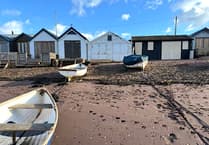THREE teenage girls were rescued after their jetski capsized about 200 yards off Eastcliff Beach, Teignmouth, on Thursday afternoon. The 14-year-olds, on holiday from Bristol, were recovered from the water by Teignmouth lifeboat crew Adam Truhol, Derek Clifton and James Trout. The girls were all wearing lifejackets and it is thought they came off the water craft when they took a sharp turn in the water. The lifeboat was called out again on Monday evening after a group of teenagers became stranded on the sandbank north of Spratt Sands, Teignmouth. Two teenagers were pulled from the sea by lifeboat Frank & Dorothy. The other three were collected by passing canoes. A group of five were spotted by a resident waving frantically from the sandbank. The sands are about 250 metres offshore but have increased in size during the winter easterly storms and are now easily visible above sea level. RNLI spokesman Tony Watson said: 'These sands are a natural magnet for children to attempt to play on. 'They are easily accessible at low water but the sands quickly become an island as the tide returns, and those caught on the sands are trapped as the water ebbs and flows between the sands and the beach in places in excess of two metres deep. 'Worse still are the rip currents that will easily carry both a wader and a swimmer away from what seems safety and out to sea – these are going to be particularly strong at spring tides. 'Just as dangerous is using an inflatable toy boat that will also be quickly carried away by both the currents and an offshore wind,' said Mr Watson. Coastguards have launched a Sea Smart campaign to warn parents and children to take extra care when at the coast. The advice is being issued after an 18 per cent increase in the number of seaside incidents last year, resulting in 2,514 cases where people needed rescue or assistance. The number of lives lost also increased from 364 to 376, having gone up by 19 per cent over the last two years. At least 20 children died in accidents on the coast during 2005 including drownings either from having been swept out to sea from rocks or the beach by freak waves or caught in strong currents or being cut off by the tide. Other incidents ending in tragedy involved jumping off high rocks, cliffs and piers and being buried by collapsing sand when digging on the beach. Chief Coastguard Peter Dymond said: 'Many incidents involving children happen on fun days out, often participating in apparently harmless activities that they have done many times before. 'However, the sea can be treacherous and powerful and can change within minutes. The main advice is to be vigilant and follow safety warnings. 'If you see someone in difficulty, dial 999 and ask for the Coastguard. Do not attempt to rescue them yourself. You would not only be putting the life of the person you are trying to rescue in danger, but also your own.'


